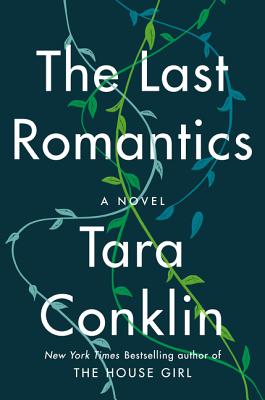A family is a promise you make to the future
The boldest choice in Seattle author Tara Conklin's new novel The Last Romantics is right there on the first page. The book's framing device is set in the year 2079. And sufferers of dystopia fatigue should know that this is not a book about survivors making their way through a war-torn destroyed city: instead, the 2079 setting is a perfectly civil poetry reading, for Fiona Skinner's bestselling collection The Love Poem.
This 2079 sequence really doesn't come up much in the course of The Last Romantics — it's basically the strategically placed clothespins that hold the plot aloft — but it's an important statement for the book. Conklin is betting big on the future: the idea that people will still care enough about poetry 60 years from now to attend readings and — in the case of Fiona's event — name their own children after prominent characters in the poems feels like a transgressive act of hope in 2019.
While the framing sequence sets in motion a mystery about a character named Luna in Fiona's best-loved poem, Romantics is really the story of Fiona's family. It starts with the sudden death of her father in 1981, and the unfolding of a summer that Fiona and her siblings will come to refer to as The Pause. The newly widowed mother, Noni, basically retires from life and lets her children go feral. Fiona, Renee, Caroline, and Joe look after each other as best they can, supporting themselves through the grief and the mysteries of childhood.
Most of Romantics takes place between The Pause and the poetry reading in the future, as Fiona and the Skinners grow up. Noni's absence looms over them all in different ways:
For years Barbie was my example of womanhood. Noni was not a woman; she was our mother, too much and too close. Our friends' mothers were irritated carpoolers, bleary-eyed pancake makers. A quick, dark ride to the movies. A hatted figure clapping lazily at a soccer game. But Barbie wore frilly dresses and pliable plastic heels. Barbie stared dully from blue eyes painted beneath a crescent of long, pretty lashes.
In the Skinner family (and likely in your family too,) the absences are just as meaningful as the presences. When Joe, the only boy, rampages through the house after their dad's death, he is creating ripples that will become stormy waters for the whole family in a few decades' time. Joe is the protector, but he needs saving the most. He's a seething vial of emotion who can't express himself in any sort of healthy way.
It's hard not to fuse the author with her characters; like Fiona, Conklin is a bestselling author, and she admits in the acknowledgements to the novel that "The idea for this book first emerged from a family tragedy and it was with great trepidation that I sat down to explore it." That rawness, that primal injury to family, is repeatedly apparent.
But while the authenticity of emotion behind Romantics is never in doubt, the book does buckle at various points under its own weight. A mystery presented in the framing sequence — who is the woman named Luna who figures in one of Fiona's best-loved poems? — propels the book along for a good while. But the revelation of the mystery is eventually handled with an awkward break in the novel's perspective that drains the plot of its propulsive energy.
Once the book's central question is answered, the last third of Romantics feels like a drawn-out tying together of loose ends. It's a structural problem that could have been solved through some streamlining, and perhaps through the adoption of a more traditional mystery novel framework to add back some of the unfortunately sapped drama.
It's true that Romantics isn't intended to be a page-turning thriller, and it has plenty to recommend for fans of family epics. Conklin has a gift for making the passage of decades feel natural and inevitable; these characters all change through the years, but they never lose their essential them-ness.
And in the end, I keep coming back to that sequence set in the future. Conditioned as I have been by recent works of fiction, I kept waiting for the Mad Max hordes to roll in and destroy everyone for daring to enjoy poetry on a desolate earth. But instead, Conklin surprised me with her big-hearted trust in humanity. We'll make it through, she's saying. We can figure it out somehow, if we stick together. We have what it takes to survive. We're human.
Paul is a co-founder of The Seattle Review of Books. He has written for The Progressive, Newsweek, Re/Code, the Utne Reader, the Los Angeles Times, the Seattle Times, the New York Observer, and many North American alternative weeklies. Paul has worked in the book business for two decades, starting as a bookseller (originally at Borders Books and Music, then at Boston's grand old Brattle Bookshop and Seattle's own Elliott Bay Book Company) and then becoming a literary critic. Formerly the books editor for the Stranger, Paul is now a fellow at Civic Ventures, a public policy incubator based out of Seattle.
Follow Paul Constant on Twitter: @paulconstant
Other recent reviews
Talk about the weather
-
Interpretative Guide to Western-Northwest Weather Forecasts
March 27, 2018
72 pages
Provided by publisherBuy on IndieBound
The man show
-
The Sexiest Man Alive
October 01, 2018
72 pages
Provided by publisherBuy online
Accidentally honest
-
The Shame of Losing
October 01, 2018
264 pages
Provided by authorBuy on IndieBound
